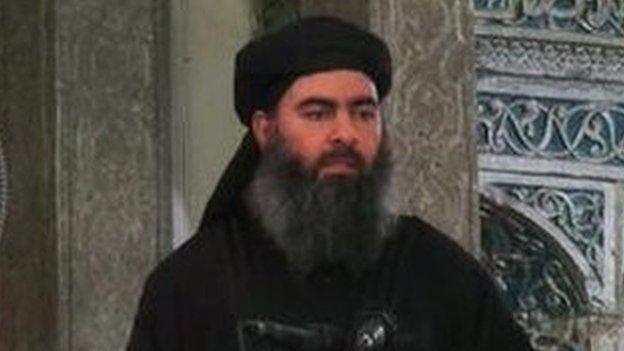US hostage Kayla Mueller 'killed by IS', say ex-slaves
- Published
Kayla Mueller was murdered by Islamic State, not killed in a coalition airstrike, a Yazidi woman told the BBC's Paul Wood
The American hostage Kayla Mueller was murdered by so-called Islamic State after being raped repeatedly by its leader.
That is the testimony of two Yazidi girls and a woman who escaped from IS captivity. They spoke to the BBC's Paul Wood in northern Iraq.
Dalal was 15 when she was captured by the "Islamic State" (IS) and taken to a slave market.
In a white villa next to a lake in Raqqa, about 60 Yazidi girls and women were made to stand in line. Rigid with fear, they waited as fighters walked up and down to choose among them. Some took one girl, some took half a dozen.
A man wearing a white dishdasha arrived. He had a long black beard, streaked with grey. A black headscarf hung down, hiding his face.
He had bodyguards and other fighters were deferential, stepping back. He stared at the girls.
"Take this one. And that one," he told one of the armed men at his side… eventually he had nine girls. "You will all convert to Islam," he said. "And you will come with me."
Speaking in whispers
Dalal told her story in a whisper, staring into the middle distance.
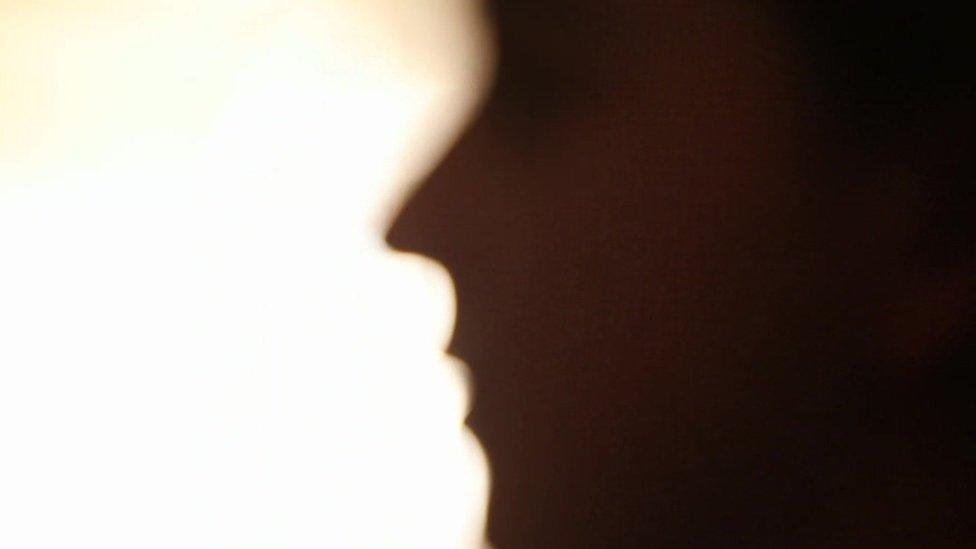
One of the Yazidi girls who escaped said Kayla "was like a sister or a mother" to them
The guards pushed and prodded the girls - they were all under 18 - and took them to the man's house.
He was called "Abu Khaled". Much later, Dalal would discover the name by which most of the world knows the man: Abu Bakr al-Baghdadi, the IS leader.
Dala's life as an IS "slave" - the term is openly used by the militant group - would bring her into contact with the American hostage Kayla Mueller, a young and idealistic aid worker kidnapped in Syria in August 2013.
Earlier this year, stories leaked by American officials suggested Kayla was "staying with a family" or had converted to Islam and married. The truth is more complicated… and grotesque.
Dalal did not meet Kayla at first. That happened after she and a younger girl, Susan, who was 13, tried to escape from Baghdadi's house and were sent to prison.
They shared a cell with Kayla, who tried to look after them. "When IS brought food for us, Kayla ate very little," said Susan. "She didn't want us to be hungry."
The guards told them not to talk to each other so they spoke in whispers.
Susan said Kayla knew a little Arabic. "She said IS taught me. She was able to talk to us."
Until now, very little was known about Kayla's time in captivity. She told the Yazidi girls she was tortured after being kidnapped - her fingernails were pulled out. Her captors were trying to get her to admit she was a spy.
They tried to pass the long hours in the cell by talking about happier things.
"We told her about our life in our village and she told us about her life in America," said Dalal.
Kayla had a pen and notebooks and used to write memoirs of her travels - in India and in France - before being taken by IS.
"Kayla had her books. She was always busy by reading them," said Susan.
'Forget your parents'
Every day, the guards would come to ask: have you prayed? Have you read your Koran?
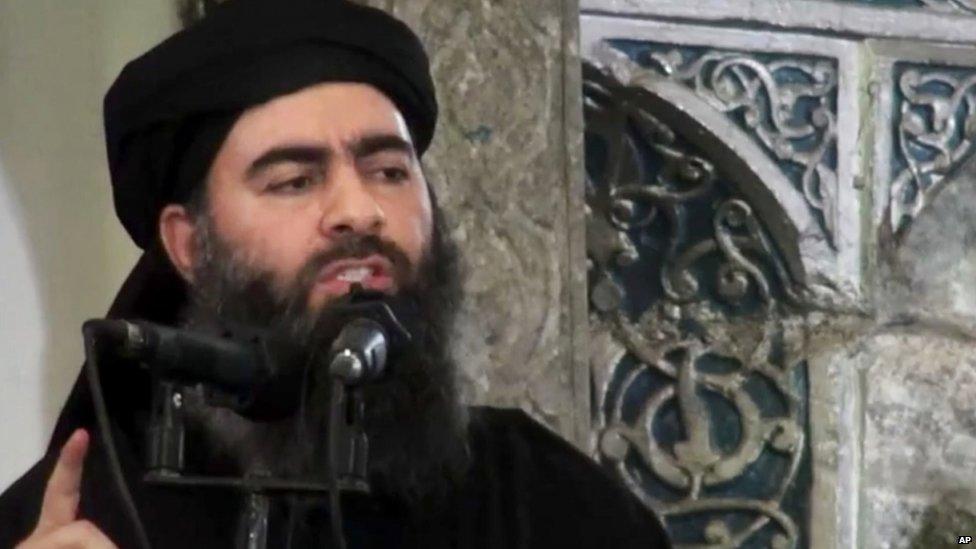
Abu Bakr al-Baghdadi has not been seen in public since he gave a sermon in Mosul more than a year ago
Kayla was afraid of them, Dalal said, so she did pray, but she never truly converted.
After some time, everyone was moved out of the prison and into the house of a man called Abu Sayyaff.
Baghdadi called soon after they got there. Dalal and Susan were sent to see him. "If you try to escape again," he told them, "your punishment will be harsher. We will kill you."
They took him seriously. When they had been in Baghdadi's house before their stay in prison he had opened a laptop to make them watch videos of Western hostages being beheaded.
This is what happens "if you refuse to convert to Islam; if you refuse to marry as we choose", he had said. "Forget your parents, you will never escape."
'Fourth wife'
Kayla was ordered to see Baghdadi next. She returned shaken, according to Dalal: "Kayla said he told her: 'I will marry you. If you refuse, I will behead you like your friends.'"
Baghdadi had also shown her the beheadings of the Western hostages, many of whom she had known before being taken.
At first they all worked as servants.
"Our life was very hard," Dalal said. "We were hungry. They beat us. We didn't know if they would kill from one moment to the next."
But then, one night, Umm Sayyaff - wife of the house owner - came to get Kayla.
Kayla returned to the room with the Yazidi girls the next day and wept.
"We asked her: 'What happened to you?'" said Dalal. "She said: 'He made me his wife and he raped me.'"
Dalal went on: "After two or three days, he called for Kayla again. He gave her a Koran. Every day, he taught her more about Islam. He dressed her in black clothes [the Muslim abaya] and he said other men in the house could not look at her."
Baghdadi bought Kayla a present, a wristwatch. He behaved as if she was his fourth wife, said Dalal - he already had three - and did not refer to her as a "slave" as he did with a Yazidi girl he forced to have sex.
Kayla, though, had not truly converted to Islam - she had not succumbed to Stockholm syndrome. She called what happened to her rape.
"She did everything Baghdadi wanted. She was too afraid to beg," said Dalal.
Susan added: "When she came back [from seeing Baghdadi], sometimes she just lay down without saying a word. Sometime she would cry under a blanket. She tried to hide that from us. She didn't want to upset us. She wanted to seem strong."
'Trophy'
Dalal and Susan were told they, too, would be "married" to some of the men in the house the following week.
They decided to run away, despite Baghdadi's threats about what would happen to them. They asked Kayla to join them.
"No, they will behead me like my journalist friends," she said. She also thought they were all more likely to get caught if she came. She told the Yazidi girls to leave without her.
"She was very afraid about getting beheaded," said Dalal. "But she was also very careful about us."
She went on: "Kayla was like a sister or a mother to us. When we cried, Susan and I, she would tell us: 'You will get home. You will see your parents again.' She was very kind person. I will never forget what she did for us."
Dalal and Susan made it out of the so-called caliphate to Kurdish-held northern Iraq. According to IS, Kayla was killed in a Jordanian air strike. But another Yazidi witness told me that is not what happened.
Amshe was 17 when she was forced to be a sex slave for Haji Mutazz - the IS number two.
He told her there was competition among the "caliphate's" senior commanders for Kayla. They wanted her for her pale skin and because she was an American. It seems she was a trophy for them.
Haji Mutazz had tried to get Kayla for himself. Amshe said he told her Baghdadi was always going to kill Kayla when he had finished with her.
Haji Mutazz laughed when he saw news reports on television that Kayla had been accidentally hit in a coalition air strike, Amshe said.
"Her stupid government," he said. "We killed her."
According to Amshe, he went on: "We killed her because she is an American. If Obama wanted to he could tell Bashar [al-Assad, the Syrian president] to stop bombing us. Ten of our women and children die every day. This is our revenge. We will kill any American citizen we capture. If any Western government refuses to put pressure on Bashar, we will kill their citizens too."
Amshe is the only source for this story. But she seemed to me a very clever, capable young woman - she led an escape, taking five Yazidi girls to safety - and her story was detailed and consistent throughout.
Officials from the US government have spoken to her and they regard her story as plausible.
Haji Mutazz died in a coalition air strike.
Abu Sayyaff - whose house Baghdadi had used to rape Kayla - died in a US special forces raid.
Umm Sayyaff, who used to fetch Kayla for Baghdadi, is now in a prison in the Kurdish city of Sulaymaniyah.
Baghdadi has not been seen in public since he gave a sermon in Mosul more than a year ago - but he remains in charge of IS.
Several thousand Yazidi women and girls are still held as slaves within the "caliphate".
- Published15 August 2015
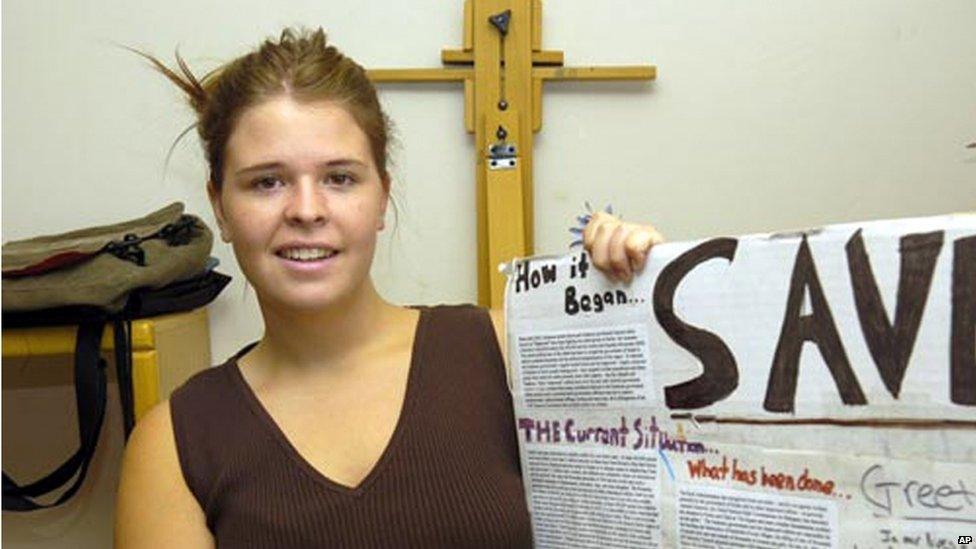
- Published10 February 2015
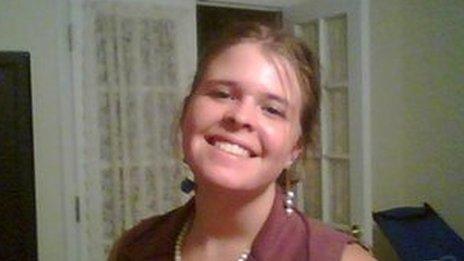
- Published11 February 2015
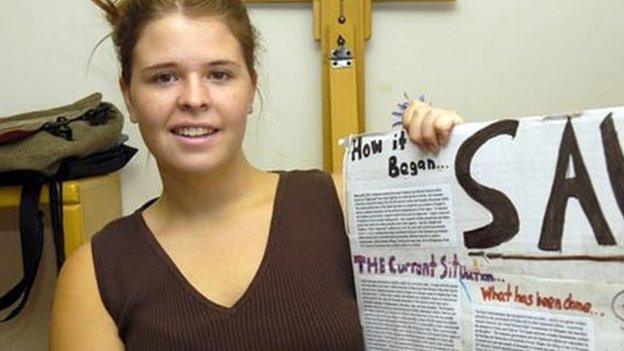
- Published15 May 2015
